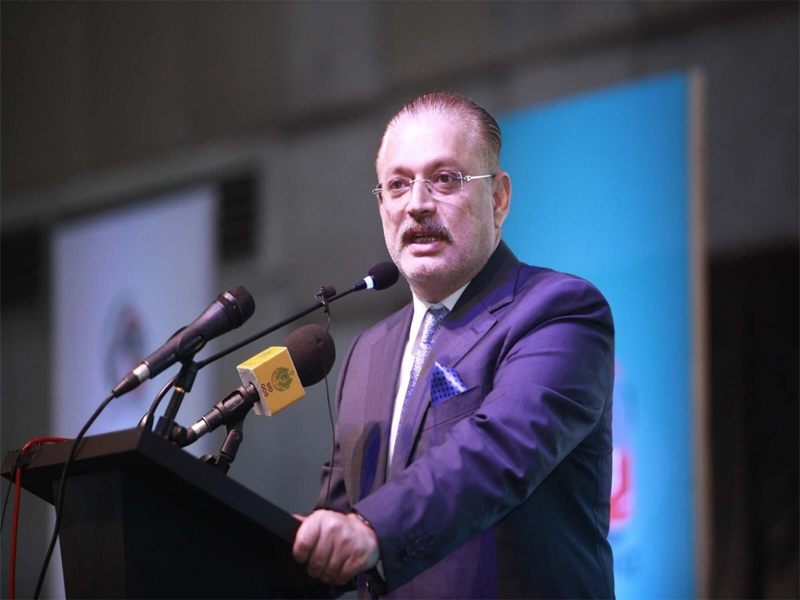Asif Ali Zardari-A political School!

- 141
- 0
69th birthday of President Asif Ali Zardari of Islamic Republic of Pakistan is being celebrated today. This is best opportunity to recognise his services for stability of Pakistan, its democracy and well-being of its people and to pay tribute to his historic achievements. One of Asif Ali Zardari's great achievements is that, after martyrdom of Benazir Bhutto, he worked tirelessly for survival and continuity of Pakistan Peoples' Party in very difficult circumstances.
After judicial killing of Shaheed Zulfiqar Ali Bhutto, terrorists' aim in martyring Benazir Bhutto was to destroy Peoples' Party. Peoples' Party transformed democratic struggle of people of Pakistan into powerful political movement in 1960s and continues to lead this democratic struggle. Peoples' Party represents not only unity of people of Pakistan but also an institution of national unity. Preserving and strengthening it is undoubtedly historic achievement for democratic and national stability. Another major achievement of Asif Ali Zardari is restoration of 1973 Constitution through 18th Constitutional Amendment, which ensures preservation of Federation of Pakistan.
This guarantee is provided by federal parliamentary democratic system established in Constitution. Asif Ali Zardari transferred his presidential powers to Parliament under 18th Constitutional Amendment for the sake of country and democracy. Now, only Parliament has authority to form, change and dissolve governments. 18th Constitutional Amendment has also significantly reduced opportunities for non-political forces to seize democratic power or interfere in political process.
It has granted greater provincial autonomy, ending sense of deprivation among smaller federal units and strengthening Federation of Pakistan. Another significant achievement of President Asif Ali Zardari is that he made crucial political decisions alongside 18th Constitutional Amendment to address threats to Pakistan's security. He gave an identity to this federal unit by renaming North West Frontier Province as Khyber Pakhtunkhwa.
This recognition ended perception that province and its adjacent tribal areas were merely 'buffer zone' in geopolitical game. Asif Ali Zardari also identified these areas as distinct units through Gilgit-Baltistan Reforms in 2009, which helped mitigate risks for Pakistan. Additionally, he not only apologised for past violations against people of Balochistan but also introduced 'Balochistan Rights Package' to integrate them into mainstream political framework of Pakistan. Another great achievement of Asif Ali Zardari is his promotion of politics of reconciliation in country.
Reconciliation is fundamental philosophy of Pakistan Peoples' Party. Shaheed Zulfiqar Ali Bhutto himself drafted party's 'fundamental document' at its establishment in 1967, with its first chapter dedicated to reconciliation. From 1970 to 2024, every election manifesto of Peoples' Party has included chapter on reconciliation. Philosophy of reconciliation advocates that instead of engaging in conflict, political forces should agree on a political and democratic programme and work together to advance democracy and peoples' rights. Way Asif Ali Zardari implemented this philosophy of reconciliation is unparalleled in modern history.
Through his conciliatory politics, he achieved significant milestones for democracy and peoples' rights, including unanimous approval of 18th Constitutional Amendment. While pursuing reconciliation with political forces, he avoided confrontation with non-political forces or establishment of Pakistan and refrained from any kind of adventurous actions.
He believed that conflicts and adventurous politics in third-world countries often damage political forces. Political and democratic evolution should not obstruct necessary adjustments of state institutions. Pakistan Peoples' Party Chairman Bilawal Bhutto Zardari is continuing this tradition of reconciliation politics, opposing traditional politics of conflict and bitterness. It is important to reference Asif Ali Zardari's historic speech in National Assembly, where he stated that era of divisive politics must end and that we should not pass on legacy of hate to future generations.
Through his conciliatory approach, Asif Ali Zardari introduced prudence, tolerance and politeness into politics, nurturing great traditions that will serve as model for genuine political forces. In political history of Pakistan, name of Asif Ali Zardari will remain prominent among those great politicians who endured hardships of long imprisonment. He was imprisoned for 11 years, facing numerous false political cases and following legal path to prove his innocence. He frequently appeared in different courts in single day. At no stage did his determination or independence waver, nor did he compromise. He respected all state institutions, including judiciary of Pakistan and never claimed that, as leader of major political party, he was above law.
He never incited his party workers to attack institutions. Like Shaheed Bhutto, Shaheed Benazir Bhutto, and thousands of other workers and leaders of Peoples' Party, he accepted court decisions. He avoided conflict with state institutions and did not drive country into chaos. Instead, he continued his political journey with great resolve, working for stability of Pakistan and democracy. Another significant achievement of his is immense patience he demonstrated during worst propaganda and media trial against him in history.
He adhered to belief that position and status of any political leader are defined by history, not by opponents' propaganda. Additionally, he advanced main mission of Peoples' Party by delivering fruits of democratic struggle to people. He continued party's programme of providing employment, housing and other basic needs, redirecting financial resources to improve living standards and implementing plans to enhance quality of life for people. What Asif Ali Zardari has done for Pakistan and its people reflects his profound political consciousness.
Born into political family, his father, Hakim Ali Zardari was progressive and people-friendly politician. He maintained close relationships with progressive and democratic thinkers in Pakistan and provided financial support to people-oriented and progressive organizations and individuals. Hakim Ali Zardari's views on Pakistan's affairs were clear and impactful.Asif Ali Zardari inherited this political awareness, which was further refined through his association with martyr Benazir Bhutto. His high political consciousness, prudence, integrity and struggle have earned him honour of serving as President of Islamic Republic of Pakistan for second term-distinction no one else has achieved. Under his leadership, Peoples' Party government was established in Balochistan for second time. Asif Ali Zardari will be remembered among those leaders whose political traditions will endure and from whom students of politics will continue to seek guidance. He is also significant figure for political opponents, serving as school of politics in his own right.

















































